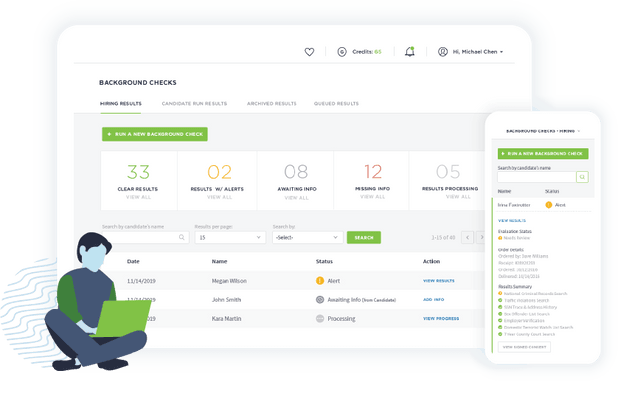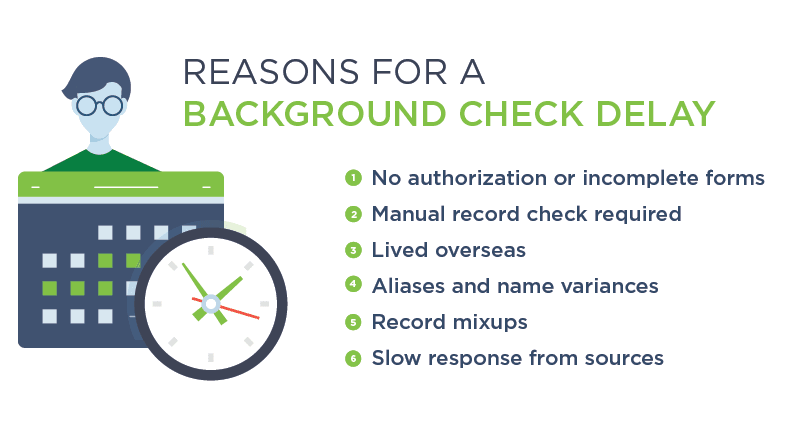GoodHire’s Platform is Built to Optimize Turnaround Times
GoodHire provides fast background check turnaround times and reliable results. Learn how our advanced background screening platform helps you hire faster.
Hayley Harrison
11 min read
Click a chapter to scroll directly to it.
Understanding how long it takes to receive background check results can help you better manage the hiring process and provide status updates to candidates, which improves the overall candidate experience. A background check can take a few minutes or several days or more to complete, depending on the type of background check, information requested, and data sources. Find out the average turnaround times for common background checks and how to reduce delays.

There are many types of background checks and the turnaround time for each varies based on the type of information requested, data source limitations, and legal requirements.
Record accessibility is one factor that determines the turnaround time for background checks. Online databases can expedite many types of background checks; however, not all records are digitized, or technical issues could interfere with accessing records.
Laws and regulations that apply to your organization may also impact the speed of a background check. For example, the federal Fair Credit Reporting Act (FCRA) requires that an employer receive written consent from a candidate before performing a background check. If a candidate doesn’t immediately respond to your request, the process will be delayed until they do.
This article provides insight into the average time for background check completion for five common background checks and includes what these checks are used for, how the data is accessed, and possible reasons why turnaround times might be delayed.
The time it takes to perform an employment background check ranges from a few minutes to five business days. It may take longer if the background check requires manual searches or cooperation from other organizations, such as professional license certifications, universities, and previous employers.
Background checks are often performed as a part of pre-employment screening. An employer may also run ongoing background checks on current employees through annual criminal background checks or regular employee drug testing to ensure a safe workplace.
An employment background check may include criminal history, employment and education verification, driving records, or other screenings. The specific checks an employer chooses to perform will impact the turnaround time for employment background checks.
Typically, federal background checks take about one day to complete.
Since a federal background check only searches for crimes prosecuted at the federal level, within the 94 US federal judicial districts, many employers choose to search both federal and state criminal records for a more comprehensive criminal history. These additional searches may add several days to the report competition time.
MVR checks, also called driving record checks, are often completed within minutes.
Many states maintain digital databases of driving records that an authorized employer or background check company can access which leads to quick turnaround times. The process may take longer in states that lack digital records, as you’ll usually need to formally request an MVR through a government agency, such as the state’s Department of Motor Vehicles (DMV). Additionally, if you require a certified MVR, this process may need to be requested by mail which can often take up to a few weeks to process.
Employment verification takes anywhere from a few minutes to a few days.
Typically, employment history verifications performed as a part of a pre-employment screening start with a search of The Work Number. This database compiles employee information submitted by millions of employers. If the candidate’s employment records are available within the database, employment verification will take only a few minutes. If the database search returns no results for your candidate, you or a background check provider will need to contact former employers directly, which can add several days to the employment verification process.
Education verification may take a few minutes or as long as a few days.
Education history checks typically begin by searching the National Student Clearinghouse, a database compiling records from thousands of academic institutions. When the information requested is already in the system, education verifications typically take only a few minutes. The process may take longer if you request information not included in the database. When this occurs, the Clearinghouse will contact a participating school directly to obtain information. The volume of pending requests and how promptly the school replies to requests will impact the turnaround time.
A state background check usually takes one to two days.
Reports that don’t return any records may come back quickly, while any case that requires additional searching or manual review may take several business days or longer. Each state has its system for handling criminal record checks. Background checks typically require less time if the state’s criminal history records are searchable online. The process will be longer in states where manual inquiries are necessary to obtain criminal history information.

Several factors can cause delays in the background check process, such as incomplete or inaccurate information, limitations of records databases, international history, aliases and nicknames, and slow response times. Here’s a look at each of these possible causes of delay.

One of the most common causes of background check delays is inaccurate or incomplete information. An employer needs certain identifying information from the candidate to use online databases or make official requests for records through employers, schools, and government agencies. If you don’t obtain all the required information or the information is inaccurate, the need to correct or require more information will slow down the background screening process.
A background check provider, like GoodHire, can lower the likelihood of inaccurate or incomplete information. Our candidate portal allows you to obtain candidate consent to comply with the FCRA and other applicable laws, and makes it easy to gather the information required to perform background checks quickly.
Limitations of records databases can also add time to the background check process. While many records are now searchable online, not all states make their records available digitally. Those searches must typically be done manually by a county clerk or a court runner. Depending on the county or case, it can take between 3 to 30 days to complete the manual portion of the search.
If a candidate lived, worked, or attended school abroad, an international background check may be necessary. These checks usually take four to five days depending on cooperation with the country; however, some countries have extensive privacy protection laws and can take up to 20 days to complete.
Not searching with aliases, nicknames, and name variances can cause delays or less comprehensive reports.. With a background check company like GoodHire, you can search all names of the candidates to help return additional results.
Slow response times from employers, educational institutions, and government agencies can also slow the background check process. Holidays and weekends may add days to the process, and the volume of requests that an organization or agency receives will also affect turnaround times.
While many background checks take only a few minutes, the process may take longer due to the availability of online records, errors and omissions, and other factors. GoodHire can lower the likelihood of unnecessary delays and speed the background check process. We offer 100+ screening options to meet your business needs, while fast, accurate results help your make timely and informed hiring decisions. Get started today.

The resources provided here are for educational purposes only and do not constitute legal advice. We advise you to consult your own counsel if you have legal questions related to your specific practices and compliance with applicable laws.
GoodHire provides fast background check turnaround times and reliable results. Learn how our advanced background screening platform helps you hire faster.
Accurate results delivered the first time means keeping qualified candidates in the pipeline, and peace of mind for you. Find out what GoodHire’s industry-leading low dispute rate means.
What does adverse action mean in hiring? Learn the steps employers must follow when taking adverse action, and the rights of job candidates who receive adverse action notices.